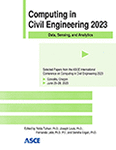Dependency Parsing-Based Information Extraction from Car Crash Narratives to Support Crash Scene Reconstruction
Publication: Computing in Civil Engineering 2023
ABSTRACT
Crash scene reconstruction is essential for reverse-engineering the factors of a crash scene to determine the cause of a crash. It requires automated information extraction (IE) from the textual crash report narratives and their formalization in a computer-processable representation. Natural language processing (NLP) is a powerful computational tool to process texts. This paper presents a dependency parsing (DP)-based NLP system for automated IE of crash events information from crash report narratives. DP-based rules and patterns were leveraged for defining relations between subjects and objects to support the IE algorithm. The proposed IE system was tested on 50 reports collected from the Southeast Michigan Council of Governments (SEMCOG) traffic crash database, which achieved an overall 94.9% precision, 90.2% recall, and 92.5% F1-score. A parallel experiment was conducted with ChatGPT to extract information from crash narratives, where an 88.0% precision and 88.0% recall were obtained.
Get full access to this article
View all available purchase options and get full access to this chapter.
REFERENCES
Alkadi, S. (2017). “Rule-based information extraction for airplane crashes reports.” International Journal of Computational Linguistics (IJCL), 8, 1–36.
Deleger, L., et al. (2013). “Large-scale evaluation of automated clinical note de-identification and its impact on information extraction.” J. Am. Med. Inform. Assoc., 20(1), 84–94.
FARO Technologies. (2022). “Crash Reconstruction | Forensic Analysis and Pre-incident Planning | FARO.” FARO, <https://www.faro.com/en/Application/Forensic-Analysis-and-Pre-incident-Planning/Crash-Reconstruction>(Jan. 17, 2022).
Feng, Y., Chen, Y., Zhang, J., Tian, C., Ren, R., Han, T., and Proctor, R. W. (2023). “Human-centred design of next generation transportation infrastructure with connected and automated vehicles: A system-of-systems perspective.” Theoretical Issues in Ergonomics Science, 1–29.
Gambi, A., Huynh, T., and Fraser, G. (2019). “Automatically reconstructing car crashes from police reports for testing self-driving cars.” 2019 IEEE/ACM 41st International Conference on Software Engineering: Companion Proceedings (ICSE-Companion).
Liu, K., and El-Gohary, N. (2017). “Ontology-based semi-supervised conditional random fields for automated information extraction from Bridge Inspection Reports.” Automation in Construction, 81, 313–327.
Liu, K., and El-Gohary, N. (2016). “Ontology-based sequence labelling for automated information extraction for supporting bridge data analytics.” Procedia Engineering, 145, 504–510.
OpenAI. (2023). “CHATGPT: Optimizing language models for dialogue.” OpenAI, OpenAI, <https://openai.com/blog/chatgpt/>(Feb. 13, 2023).
Ren, R., Li, H., Han, T., Tian, C., Zhang, C., Zhang, J., Proctor, R., Chen, Y., and Feng, Y. (2023). “Vehicle crash simulations for safety: Introduction of connected and automated vehicles on the roadways.” Accident Analysis & Prevention, 186(June 2023), 1–13.
SEMCOG (Southeast Michigan Council of Governments). (2022). “Southeast Michigan Council of Governments.” SEMCOG, <https://semcog.org/>(Dec. 8, 2022).
spaCy. (2022). “Spacy · industrial-strength natural language processing in python.” Industrial-strength Natural Language Processing in Python, <https://spacy.io/>(Feb. 9, 2023).
Yehia, E., Boshnak, H., AbdelGaber, S., Abdo, A., and Elzanfaly, D. S. (2019). “Ontology-based clinical information extraction from physician’s free-text notes.” Journal of Biomedical Informatics, 98, 103276.
Zhang, J., and El-Gohary, N. (2016). “Semantic NLP-based information extraction from construction regulatory documents for automated compliance checking.” Journal of Computing in Civil Engineering, 30(2).
Zhang, J., and El-Gohary, N. M. (2015). “Automated Information Transformation for automated regulatory compliance checking in construction.” Journal of Computing in Civil Engineering, 29(4).
Zhou, P., and El-Gohary, N. (2017). “Ontology-based automated information extraction from building energy conservation codes.” Automation in Construction, 74(Feb. 2017), 103–117.
Information & Authors
Information
Published In
History
Published online: Jan 25, 2024
ASCE Technical Topics:
- Algorithms
- Automation and robotics
- Automobiles
- Business management
- Computing in civil engineering
- Construction engineering
- Construction management
- Databases
- Engineering fundamentals
- Government
- Highway transportation
- Information Technology (IT)
- Infrastructure
- Mathematics
- Organizations
- Practice and Profession
- Systems engineering
- Traffic accidents
- Traffic engineering
- Traffic management
- Transportation engineering
- Vehicles
Authors
Metrics & Citations
Metrics
Citations
Download citation
If you have the appropriate software installed, you can download article citation data to the citation manager of your choice. Simply select your manager software from the list below and click Download.
